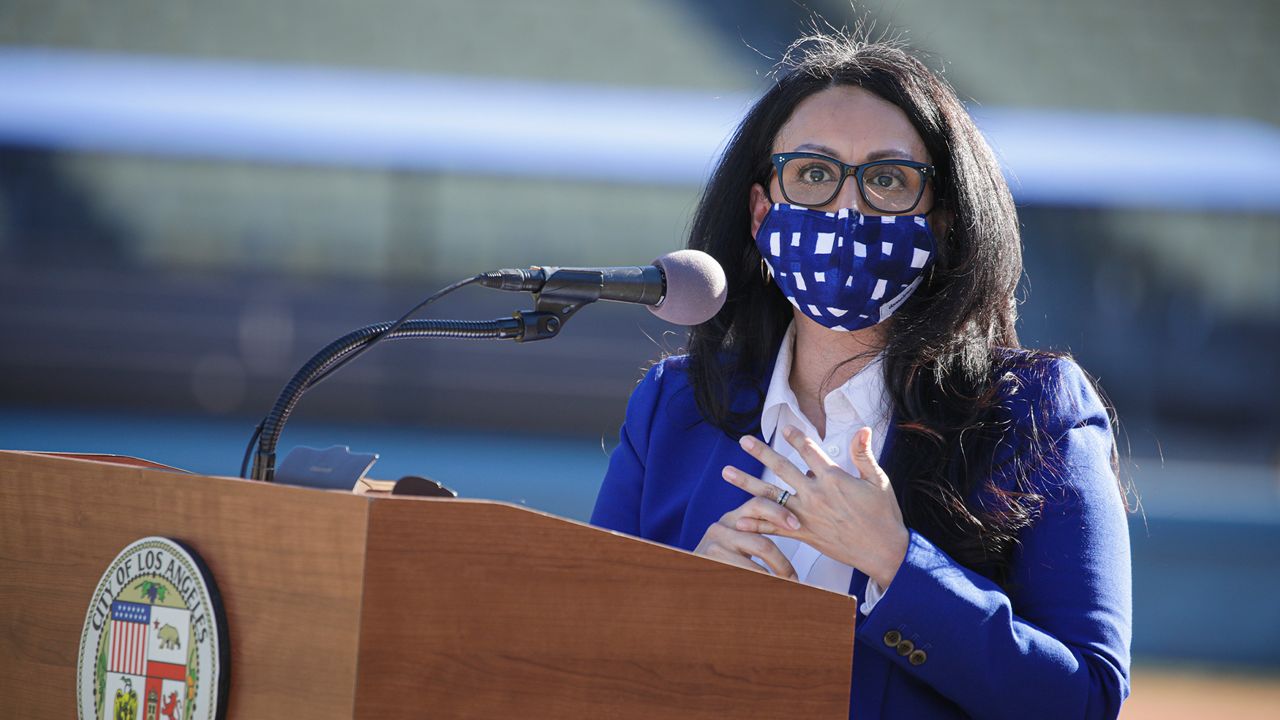LOS ANGELES (CNS) — The Los Angeles City Council finalized an ordinance Tuesday that will prohibit protests within 300 feet of the target's residence, a policy developed after activists protesting the city's COVID-19 vaccine mandate showed up at two council members' homes last month.
The ordinance received 13 yes votes, with Councilwoman Nithya Raman and Councilman Mike Bonin casting dissenting votes. The ordinance required unanimous approval on its first reading, and was held for a final vote Tuesday, when it required 12 yes votes to pass.
Ordinances typically require a simple majority upon the second reading, but this ordinance includes an urgency clause to go into effect immediately upon publication. When urgency clauses are included, the ordinance requires approval from three-fourths of the City Council.
The motion to request the ordinance was introduced by Council President Nury Martinez and Councilman Mitch O'Farrell on Aug. 31. Two days earlier, an anti-vaccine mandate protester at a Santa Monica rally shared the addresses of council members and encouraged people to go to their homes if they voted for an ordinance to require at least partial proof of COVID-19 vaccination before entering most indoor public spaces in the city.
"We have one week to stop the (vaccination) passports ... if it's unanimous, we've lost. Sharpen your knives, get your guns, get your food now," the protester said while holding a sign with council members' home addresses. "... We find out who voted yes and you show up at their house. We need to intimidate these people."
After the rally, protesters, including gubernatorial recall candidate David Alexander Bramante, showed up at the homes of Martinez and O'Farrell.
"I had a group of folks show up at my doorstep, banging on my door, banging on my windows, harassing my neighbors, screaming obscenities into my daughter's bedroom and yelling into bull horns asking me to come out and threatening my life," Martinez said on Aug. 31.
On Tuesday, before the final vote, Martinez added:
"I think it's clear to me that these protests are now starting to escalate more and more, and what I'm really concerned about is the escalation of an actual violent event taking place anywhere in our neighborhoods."
A group of organizations, including the National Lawyers Guild Los Angeles, the Los Angeles Community Action Network, Sunrise Movement L.A., Democratic Socialists of America - Los Angeles and the People's City Council endorsed a letter against the ordinance.
"The current proposed law conflates illegal actions taken by violent right wing extremists as protesting and uses such actions as political cover to in turn restrict constituents from exercising their First Amendment rights to protest the ongoing failures of our local elected leadership," the letter said after noting that the city already prohibits protests within 100 feet of the target's private residence.
"These right wing extremists have harassed and endangered grocery store workers and mall employees, shut down vaccination sites, attacked journalist Frank Stoltz, attacked female journalist Tina-Desiree Berg, and showed up to the home of independent journalist Emily Molli, among other offenses. The 300 ft ordinance does nothing to address this threat," the letter continued.
"It does however target the political speech of organizations like Black Lives Matter LA, Los Angeles Community Action Network, Stop LAPD Spying Coalition, Services Not Sweeps Coalition, and Sunrise Movement LA who have righteously utilized protests outside residential dwellings to bring attention to harmful policies and disengaged politicians."
Martinez said people who want to protest elected officials should go to public buildings, such as their offices or City Hall, not their homes.
"No staffers, no family members of ours should be subjected to this kind of treatment. My address and my home is not a public place for you to come and protest," she said.
Speaking from City Hall on Sept. 13 during an unrelated news conference, Mayor Eric Garcetti similarly said that he thinks it's important to protect the rights of private citizens, including neighbors of public officials and people who live with public officials. He added that some of the "darkest chapters" in U.S. history involve people targeting private homes.
Protesters with Sunrise Movement L.A., BLM-Los Angeles, the Los Angeles Tenants Union, People's City Council, Street Watch L.A., Ktown For All, and J-Town Action demonstrated against the ordinance outside Martinez's house on Sept. 14 by banging pots and pans and speaking through bull horns. It appeared some of the protesters, who were standing on the sidewalk in front of Martinez's driveway, were in violation of the city's current laws, which prohibit "targeted demonstrations focused upon and at or about a private residence" that take place within 100 feet of the address.
Protesters returned to Martinez's house on Tuesday morning to protest the ordinance before the final vote.
Raman cast the sole dissenting vote on the motion to develop the ordinance, saying the city should focus on enforcing its existing law instead of adding an ordinance that "will likely have the exact same problems in its design and its enforcement."
Bonin voted for the motion to request the ordinance but expressed concerns, saying that the city needs to focus on enforcement of existing laws. Neither Raman nor Bonin spoke before casting their dissenting votes Tuesday.
Several people called into the council meeting on Sept. 14 to oppose the ordinance, calling it a violation of First Amendment rights. Ricci Sergienko of the People's City Council said he would sue the city if the ordinance takes effect.
The draft ordinance states that a person who is "aggrieved" by violators of the ordinance can sue for damages. The violator may also face a civil penalty of up to $1,000 per violation



